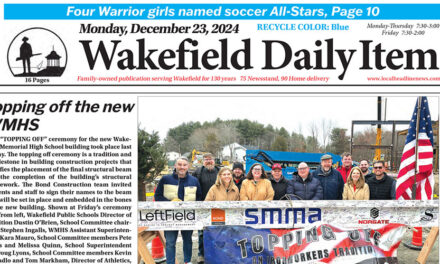By GAIL LOWE
WAKEFIELD — Superintendent of Schools Dr. Stephen K. Zrike has announced that the 1:1 Technology Learning Initiative at the Galvin Middle School has been implemented.
As part of the initiative, students will use Google apps for the Education Learning Platform for regular collaboration, receive instant feedback on assignments and be better prepared for computer-based assessments.
“In moving into our new building, we have learned much about the effective use of technology from our early adopter teachers within all teams and departments,” said Zrike. “Student learning and achievement will be enhanced through the seamless access to technology.”
According to the school’s Vision and Usage Plan concerning technology, the following applies:
Vision: Reshape the culture of teaching and learning by empowering teachers and students to interact within the school’s collaborative environment to solve real world problems across our one-to-world digital landscape.
Why 1:1 at the Galvin and not Bring Your Own Device:
Middle school students are being provided with a foundational experience using Google Apps for Education so they enter high school with the experiential flexibility to choose a device that best meets their educational needs.
Standard Operational Expectations:
As part of this initiative, parents can expect that students will:
• Use the Google apps for the Education Learning Platform for regular collaboration.
• Receive instant feedback on assignments.
• Be better prepared for computer-based assessments.
Examples of what the Galvin community is doing with technology:
• Teaching students the fundamentals for digital citizenship,
• Utilizing a learning management system to administer, document, report and deliver educational technology resources.
• Using the Galvin learning commons website and online catalog to access and locate print and electronic resources, using databases, e-books and advanced Google search to find articles pertaining to research topics.
• Creating slideshows for students to demonstrate knowledge and research skills.
• Video game design and “hour of code” programming activities.
• Practicing math skills, including visualizing transformations on a coordinate grid.
• Using various subject-related web resources to complement class discussions.
• Keyboarding.
• Using Google forms for in-class assessment.
• Reading articles and responding to analysis questions.
• Using Google sheets as an online agenda book for students with writing-related disabilities.
In support of this effort, Zrike said school officials will continue to support staff through ongoing professional development and guidance on how to most effectively integrate Chromebook as part of regular instruction.




